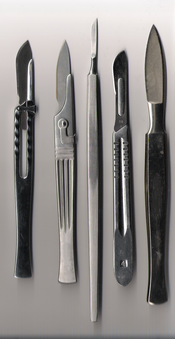
Surgical instruments
Encyclopedia

Surgery
Surgery is an ancient medical specialty that uses operative manual and instrumental techniques on a patient to investigate and/or treat a pathological condition such as disease or injury, or to help improve bodily function or appearance.An act of performing surgery may be called a surgical...
or operation, such as modifying biological tissue
Biological tissue
Tissue is a cellular organizational level intermediate between cells and a complete organism. A tissue is an ensemble of cells, not necessarily identical, but from the same origin, that together carry out a specific function. These are called tissues because of their identical functioning...
, or to provide access for viewing it. Over time, many different kinds of surgical instruments and tools have been invented. Some surgical instruments are designed for general use in surgery, while others are designed for a specific procedure or surgery. Accordingly, the nomenclature of surgical instruments follows certain patterns, such as a description of the action it performs (for example, scalpel
Scalpel
A scalpel, or lancet, is a small and extremely sharp bladed instrument used for surgery, anatomical dissection, and various arts and crafts . Scalpels may be single-use disposable or re-usable. Re-usable scalpels can have attached, resharpenable blades or, more commonly, non-attached, replaceable...
, hemostat
Hemostat
A hemostat , is a vital surgical tool used in almost any surgical procedure, usually to control bleeding. Therefore, it is not uncommon to see the initial incision lined with hemostats closing blood vessels awaiting ligation during the initial phases of surgery...
), the name of its inventor(s) (for example, the Kocher forceps), or a compound scientific name related to the kind of surgery (for example, a tracheotome
Tracheotome
A tracheotome is a medical instrument used to perform an incision in the trachea with a cutting blade operated by a powered cannula. It is often called a tracheostomy tube because once it enters the stoma in the trachea, a breathing tube is connected to a ventilator and oxygen is provided to the...
is a tool used to perform a tracheotomy
Tracheotomy
Among the oldest described surgical procedures, tracheotomy consists of making an incision on the anterior aspect of the neck and opening a direct airway through an incision in the trachea...
).
The expression surgical instrumentation is somewhat interchangeably used with surgical instruments, but its meaning in medical jargon is really the activity of providing assistance to a surgeon with the proper handling of surgical instruments during an operation, by a specialized professional, usually a surgical technologist
Surgical technologist
A surgical technologist, also called "scrub tech," "surgical technician," or "operating room technician", is an allied health professional working as a part of the team delivering surgical care in some countries. They possess knowledge and skills in sterile and aseptic techniques...
or sometimes a nurse or radiologic technologist.

